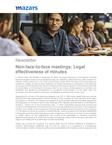
Non-face-to-face meetings: Legal effectiveness of minutes
Regarding the minutes of the decisions adopted, Law 222 of 1995 clearly states that they must be signed by the legal representative and the secretary of the company, or in the absence of the latter, by a partner or member of the board. It is important to point out that unlike the formalities required for the preparation of minutes in face-to-face meetings of the highest corporate body or of the Board of Directors - Article 431 of the Commercial Code - in which said bodies express their consent and consent in the designation of the persons who are to act as president and secretary of the respective meeting, the minutes must be signed by the legal representative and the secretary of the company, or in the absence thereof, by a partner or board member, unless any special rule has been established in the bylaws and who by law must sign as a sign of approval, in the case of non face-to-face meetings or written voting, the law supplements the consent of the associates or members, expressly determining the persons to whom this formality corresponds, without which the document does not acquire full validity and its content does not become binding.
Taking into account the foregoing, it is valid to state that the Ordinary Meetings of Members or Ordinary Shareholders' Meetings may be held by means of a successive or simultaneous communication and the minutes recording what was decided at the meeting must be signed by the legal representative and the secretary of the corporation or, in the absence of the latter, by one of the partners or shareholders.
Article 422 of the Code of Commerce states that the distribution of profits shall be resolved in the ordinary meetings and, therefore, the minutes of the Meeting or Assembly shall be the only means to prove what was decided therein. In turn, Article 156 of the same bylaws states that "(...) the balance sheet and the authentic copy of the minutes containing the resolutions validly approved by the shareholders' meeting or assembly shall be enforceable". Thus, if a non-attendance meeting is held that has the nature of an Ordinary Meeting or Assembly, but the minutes recording the decree of profits are not signed by the persons indicated in the preceding paragraphs, it will not be possible to resort to an executive process in order to obtain the payment of the profits decreed, since the title that would support the claim (i.e. minutes of the Assembly or Meeting), lacks full legal effects.


